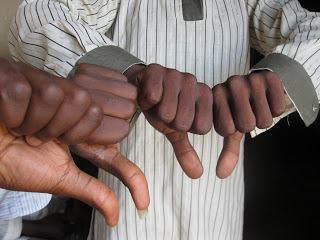 |
| Thumbs Down: Rights groups say free expression in Gambia “shrinking” (Photo Credit: MSJoof/TNBES/FPI) |
The Gambia, a small West African country which is no stranger to criticisms over rights abuses by human rights groups, opposition parties and journalists, is today (October 28, 2014) appearing before UN Human Rights Council for its Universal Periodic Review (UPR).
A statement from the multinational rights group says it calls for concerted regional and international efforts to “stop the violent repression against free voices and end impunity.”
“ARTICLE 19 is deeply concerned about the lack of public space for citizens and the media in The Gambia. Opportunities for freedom of expression, including through the internet, are shrinking by the day,” says Fatou Jagne Senghor, Regional Director of ARTICLE 19 West Africa.
“Repression and fear have reached an alarming level inhibiting Gambians to have a say in the country’s public affairs,” she adds.
According to ARTICLE 19, The Gambian government rejected most of the recommendations relating to freedom of expression during the last UPR in 2010. And although it committed to end impunity for human rights violations against journalists, human rights defenders, and political opponents, it has failed to fulfill this commitment.
It says resolutions and reports from the African Commission on Human Rights, the African Union human rights body based in The Gambia, and major ECOWAS court rulings on crimes against journalists have yet to be given any consideration.
‘Unique opportunity’
“Since the last UPR [in 2010], a series of restrictive laws inhibiting free expression of citizens, journalists and human rights defenders have been adopted to tighten the already repressive legal arsenal,” the Dakar-based ARTICLE 19 West Africa says.
It notes that besides the laws, persecutions of journalists, political opponents, human rights defenders and citizens have continued with total impunity.
It says more than a dozen journalists and human rights defenders were forced to leave the country in the last four years, adding to the alarming number of people forced into exile in the last two decades due to the systematic persecution of dissident views and injustices.
Fatou Jagne Senghor said the UPR offers a “unique opportunity” for countries to face a reality check of their Human rights situation through a peer review.
“The Gambia should seize this opportunity to change its course and respect its international human rights commitments,” she says.
Constitutional provisions
In its National Report to the UPR, The Gambia Government did not deny alleged rights abuses, but says the country’s constitution guarantees every person the right to freedom of speech, expression and assembly.
It says it is committed to creating a conducive environment for the media to operate freely and to ensure a free flow of information as provided for in the Constitution.
“The right to freedom of expression is, however, not absolute. In addition to the limitations to the rights enshrined in the Constitution, the Criminal Code creates the offences of criminal libel and sedition,” the government’s report states.
“The Gambia is committed to the implementation of the international Human Rights instruments it is a party to and would continue in its endeavour to promote and protect Human Rights in the country, with the conviction that the respect for all human rights is a national responsibility,” it states.
The government says since 1994, there has been a steady increase in the number of radio stations (15 privately-owned and 8 Community-owned) and newspapers (5 daily and 2 weekly) in The Gambia.
‘Fear of being shut down’
Rights groups say the space for free media and free expression is severely restricted. “This has led to self-censorship by journalists,” The Gambia Human Rights Network (GHRN) says in a statement delivered at the UPR.
“As a consequence, radio stations – traditionally the greatest source of information for the populace – restrict themselves to music and sports programming out of fear of being shut down by the government for venturing into matters deemed political in nature,” says Alieu Badara Ceesay.
- This story first appeared here
Written by Modou S. Joof
Follow on Facebook: The North Bank Evening Standard
Related articles






No comments:
Post a Comment
The views expressed in this section are the authors' own. It does not represent The North Bank Evening Standard (TNBES)'s editorial policy. Also, TNBES is not responsible for content on external links.